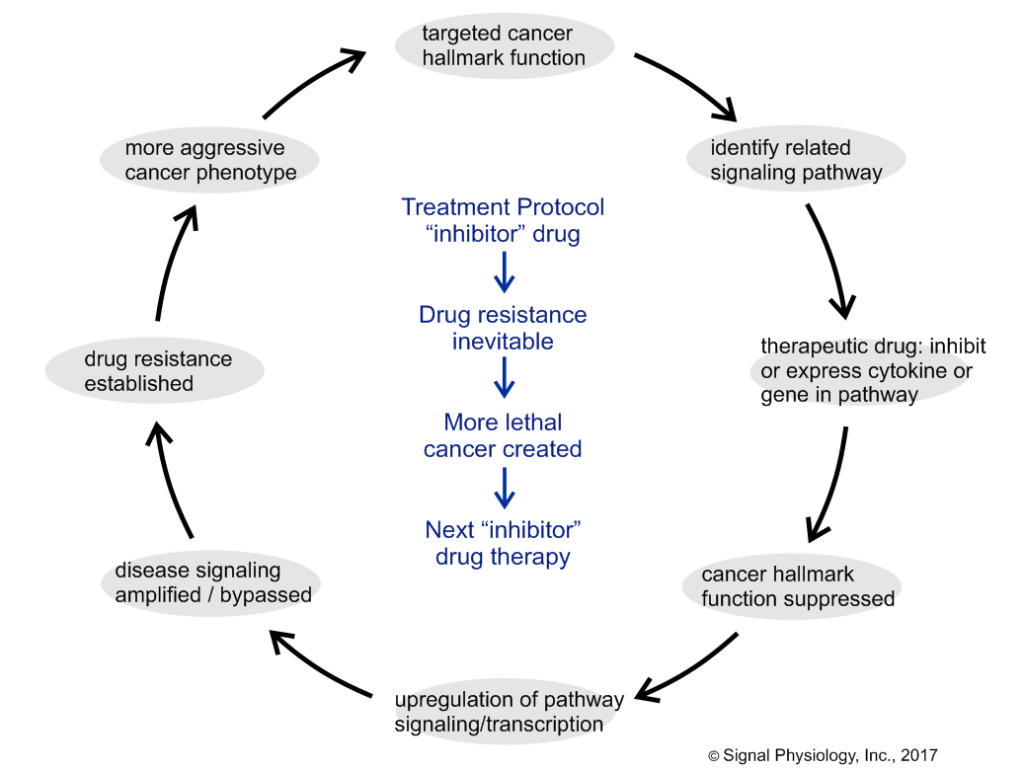“ADT (androgen deprivation therapy, or hormone therapy) is commonly employed in the treatment of advanced prostate cancer. But androgen deprivation therapy is not curative [2], so the lethal CRPC (castrate resistant prostate cancer) is inevitable.” “… the mechanisms by which tumors acquire androgen independence remain unclear and need to be addressed before effective treatment strategies can be developed.”
Somatostatin Derivative (smsDX) Targets Cellular Metabolism in Prostate Cancer Cells after Androgen Deprivation Therapy, L Yan, et al, 2013

Prostate Cancer – The Current Landscape
In the excerpt above, researchers recognize that for prostate cancer patients undergoing hormone therapy (ADT), their cancer will eventually become resistant. Prostate cancer patients that have experience a recurrence of their cancer are routinely prescribed ADT. The inevitable resistance to the drug occurs within 12-24 months. The resistant cancer created is termed CRPC, castrate resistant prostate cancer. This cancer is “not curable,” and while some would dispute this, CRPC is much more aggressive than the cancer that was originally treated. Due to overtreatment of prostate cancer in the last 10 years, there exists over 2 million men in the U.S. (“survivors”) with incurable prostate cancer. Resistance to cancer drugs, chemotherapy, is inevitable. In attempts to “heal” its cancer, the body creates a more aggressive, more deadly cancer.

(To see our alternative approach go to page entitled, “Another Path“)
Regarding disease genetics and cell signaling, there exist two pathways for medicine to proceed. Either utilize cell signaling information to obstruct physiology or to utilize cell signaling information to monitor treatment efficacy.
Cell signaling comprises genetics, epigenetics, gene expression and other compounds that make up signaling (lipids, glycans, peptides, enzymes, chemokines, cytokines, proteases and others) represent a brand new approach to understanding disease and will dramatically change the way we diagnose and treatment disease. What exactly is “cell signaling?”
Chronic diseases, including cancers, will be at the forefront, as cell signaling conclusively demonstrates that the signaling pathways of chronic diseases are dramatically similar. At the center of these pathways, are the agents of inflammation and corresponding markers, the evidence to confirm why chronic diseases are “chronic.”
A losing battle, no matter what you have heard, more people are dying of cancer than ever before. No need for debate regarding the nature of chronic disease and cancers. The debate must begin about how medicine will evolve to capitalize upon this newfound knowledge to begin to win the battle against cancer.
The only question is how established medicine will integrate this new-found knowledge into current practice. The track record has been mediocre at best. Chemotherapy drugs have received accelerated FDA approval to be administered to cancer patients. These drugs have resulted in substantial suffering and very high cost of care with little improvement in overall survival or disease-specific survival. Medical researchers readily admit that the cellular signaling environment is complex, redundant and adaptive. Yet, medicine continues to research, develop, approve and deliver drugs designed to inhibit or obstruct a specific signaling protein. What was originally feared has been proven many times and continues today: these drugs inevitably create a more aggressive, more deadly cancer, resistant to the the chemotherapy drug originally administered.
